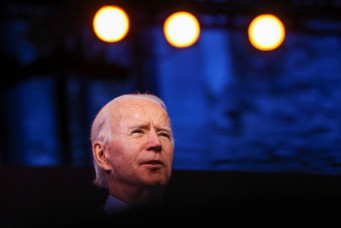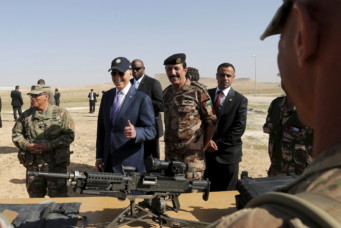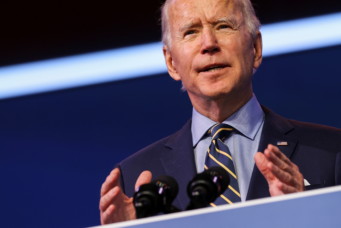Biden Negotiating the Balance of Power
Director of the Boston Consortium for Arab Region Studies, Denis Sullivan, discusses U.S. President Joe Biden’s foreign policy plans in the Middle East.
November 8, 2020 Hamad Mohammed/Reuters
Today is March 8, 2021.
Cairo Review Contributing Editor Sydney Wise sat down with Dr. Denis Sullivan, who currently acts as Dean of the College of Humanities and Social Sciences at Zayed University and is Director of the Boston Consortium for Arab Region Studies.
This is part one of their two part conversation. In this episode Sullivan discusses what can be expected from U.S. President Joe Biden’s foreign policy plans in the Middle East.
Cairo Review: What does the balance of power look like at the moment, and how is that related to Trump’s last four years?
Denis Sullivan: Everything is related to Trump’s last four years, for sure. For the Middle East, it’s a great question, actually, because I think it defies clear explanation. On the one hand, because of Trump’s policies you certainly had Israel, Saudi Arabia, the United Arab Emirates not just ascendant, but dominant as things came together with the Abraham Accords and the normalization between the Emirates and Israel (among others, but the Emirates–Israel deal basically brought both up).
These were kind of rising tides for these three in particular, and therefore descendant but plateaued on the bottom for Iran. In other words, everyone wanted Iran to collapse, or at least the regime to collapse, and have it be reconstituted as pro-U.S., neutral-Israel, neutral toward Saudi, neutral toward the Emirates, as opposed to the antagonism that exists: and, I’ll say, not nearly by Iran’s doing but by all of the above that I’ve just mentioned, including the Trump administration.
So, where things are now, however: I think just the election of Joe Biden, and especially the team he has put in place to help him on Iran and on the Middle East broadly and foreign affairs more broadly, means that Israel and Saudi Arabia and the Emirates are not on the decline, by any means, but they’re just not going to continue to rise in the sense that they would if the Trump administration were to continue. In other words, these are the three dominant powers in the Middle East, at least today, and they’re not going to become any less so. However, that means they have to reconfigure their dealings with the United States, among others. By the way, I should throw in Turkey, but we can get to Turkey later because I think that, regionally, Turkey is absolutely a dominant player and fits in with those other three. Turkey is in a different set of geostrategic interests of the United States but overlapping, absolutely, with Iran, with Iraq, with Saudi Arabia, with Israel.
That said, we come to the Biden team.
I think one of the first ones was really an important question to ask about: “is this like a third Obama term?” And again, it’s one of those yes and no responses. Yes in the sense that, yes, these are a lot of the same players, absolutely. But it’s also—I think in particular Jake Sullivan, the new National Security Advisor, being one of those guys who was more of a mainstream Democrat in the Obama years and in his four years, as they all were, kind of in wilderness, in exile from power, and now they’re back—I’ve heard interviews with Jake Sullivan, and I don’t want to say he’s shifted left by any means, but he’s certainly learned from some of the mistakes that were made. Or at least decisions that were made at the time in good faith, but now they certainly wouldn’t make such decisions.
So you’ve got people like Jake Sullivan, William Burns, of course Anthony Blinken, but also Rob Malley, Samantha Power. All of these names. Did I mention McGurk, Brett McGurk? What’s interesting about McGurk is that he served under Bush, Obama, and Trump, and then he resigned right after Trump announced the withdrawal of American troops from Syria. And I had the feeling that that was very convenient, because he was kind of hedging his bets hoping that Biden would win, perhaps, so he could be brought back, and he was.
Anyway: that team, yeah, certainly comes out of the Obama administration, but, as I say, they kind of all have had their four years of learning. And, also just the new reality. They’re coming in, I would say, maybe chastened by some of their own decisions. And again, it’s not like any of them are coming in to lessen Israel’s power.
In fact, Anthony Blinken himself said that they will never walk away from Israel’s security. He’s been reassuring the Israelis that, look, we’re not here to undercut you: we’re just against your policies and we’re your dear friends. So we want to work with you, but we want to ask you to put a check on yourselves. Again, sadly, I don’t think the United States, perhaps since George HW Bush, has had really any checks on Israeli foreign policy. It’s rare that we hear any American administration, Republican or Democrat, doing it. In fact, Obama himself kept raising aid to Israel, even if he and Bibi Netanyahu were on horrible terms.
So the point is, this administration, these players, all come in and will bring us back to an Iran nuclear deal. Whether it’s the same deal, I doubt, but it’ll be something similar because that’s the commitment. So that’s the strategic viewpoint, and I think that, frankly, that it’s the dominant strategic plan, if not even a strategic doctrine for the United States, to reset what was working—not perfectly, by any means—to bring Iran back into the fold. Because, again, Biden’s not going to be anti-Mohammed Salman, he’s not going to be anti-Mohammed bin Zayed, even. And he’s not going to be anti-Bibi Netanyahu. But, he is going to be checking them, not just giving them carte blanche, and we already see as a result that the Saudis and the Emiratis have already been doing this; I think actually for a year now, the Emiratis actually started this by pulling back from this disastrous war in Yemen. The Saudis are looking for a face-saving way to be done with it and, yes, the Biden administration is pushing by saying “yes, we’re going to end our support for this disastrous war.” I don’t know if “disastrous” is my word only but it’s certainly the sentiment of the Biden administration, that this (the Yemeni conflict) is the, quote-unquote, greatest humanitarian crisis of our time, supported by the United States i.e. under the Obama administration since 2015.
So this is not just to beat up on Trump, but we also have to beat up on the Obama administration for starting the support for this absolutely disastrous war. And the slaughter of Yemenis, and the cholera, and the famine, and the refugee crisis that it has caused. And, again, a lot of those players that we have now were part of that and they’re like “oops, shouldn’t have done that.” Yeah, well, six years later, time to undo it.
CR: One of the first actions taken by the Biden administration was to institute a review and a reversal of the designation of the Houthis as a terrorist organization. This designation had been made in the final days of the Trump administration. Can we speak a little bit to how the U.S. conceptualization of the Houthis fits into this greater “big power” scheme particularly between Iran and Saudi Arabia?
DS: Again, as I emphasize, Obama started it by giving the green light to Mohammed bin Salman. So, then the conceptualization was “yeah, we did that; we shouldn’t have done that.” I’ve seen interviews with Rob Malley even before Biden won where he was saying “yeah, wish we hadn’t done that.” Because the point there was we needed to give a gift to Mohammed bin Salman and let him play in Yemen for three weeks because Mohammed bin Salman said “oh, we just need three weeks and we’ll stop this crazy war between the Houthis and our allies and therefore we’ll prevent Iran from getting stronger ties in Yemen.”
Jump ahead a few years and we know that that’s exactly what they did do. It’s one of those self-fulfilling prophecies, we did this and we brought in Iran into Yemen even more. So, back to the Obama administration, it was “ok, let Mohammed bin Salman play in Yemen; we’ll be there to check him so that he doesn’t go overboard.” Well, they never did that. So the conceptualization for the United States was “we’re going to make this deal with Iran; we need to placate Mohammed bin Salman shwaya, just a little bit; we’ll do our deal with Iran because otherwise he’ll be so upset with us he’ll undercut us at every turn, but he’ll know that we’re supporting him by us literally supporting his war effort in Yemen.”
That only accelerated under Donald Trump, and, again, that’s when we get the worst humanitarian disaster the world has seen over the last five years. And that’s when even the Emiratis were saying, “this has gone too far, let’s pull back”; slight differences of opinion—maybe that’s even an exaggeration, maybe more than slight differences—between MBS and MB Zayed, between the Saudis and the Emiratis. Again, Iran was actually ascendant in Yemen. You can even talk to the Houthis before or even at the start of this; they had massive theological differences of opinion over the two types of Shi’a Islam between the Houthis and the Iranians, but politically speaking, militarily thinking, strategically, they’re fully aligned. Because the Saudis engaged in this disastrous war, the Houthis had no recourse but to turn to Iran for even more support. So, Iran was supportive of the Houthis, but kind of a cold alliance. But, that alliance has only heated up because of the disastrous war launched against the Houthis.
So, back to the designation. Yes, Trump would do anything he could to kind of pre-seed the ground for a Biden administration, and this is, you know, whether it’s Cuba or Iran or other major designations that the Obama administration started with. Trump was not only undoing what Obama did; he was trying to pre-empt any major initiative again for Cuba, for Iran, for Yemen.
So, by (the Trump Administration) making this designation (that the Houthis are terrorists): it was a crime, I’ll say. And maybe I’ll have to say it’s a “small c” crime, but I think, you know, some people could make the case that it’s a crime against humanity because the Houthis—I’m not a fan of the Houthis, I’m not supportive of the Houthis, they also have engaged in atrocities—but the problem with this designation is that it prevents really good groups, international NGOs, refugee committees, international humanitarian organizations, from getting food and medicine and other things, blankets, tents, food water, all of those things that these starving, increasingly sick from cholera and other diseases—the Houthis are, sadly, the gateway to those people. Because they control a key port, if not ports. They control key access roads, they control key territories, and these international organizations and the United Nations themselves need to go through Houthi territory, Houthi-controlled territory.
So, by designating the Houthis in this way (as a terrorist organization), nominally, it prevents all of those groups from dealing with the Houthis because even the United Nations would be labeled as supporting terrorists. So again, it’s one of those just—hypocritical is the mildest way to say it—it’s just one of the nastiest things Secretary of State Pompeo and Donald Trump could do to the people of Yemen. It’s just pouring more acid and salt into open wounds, and maintaining the status quo of inhumanity against a desperate twenty million Yemeni people.
Denis Sullivan is the Dean of the College of Humanities & Social Sciences at Zayed University in Dubai, United Arab Emirates. He is also a professor of Political Science and International Affairs and the Co-Director of the Middle East Center at Northeastern University since 1987.
Subscribe to Our Newsletter





